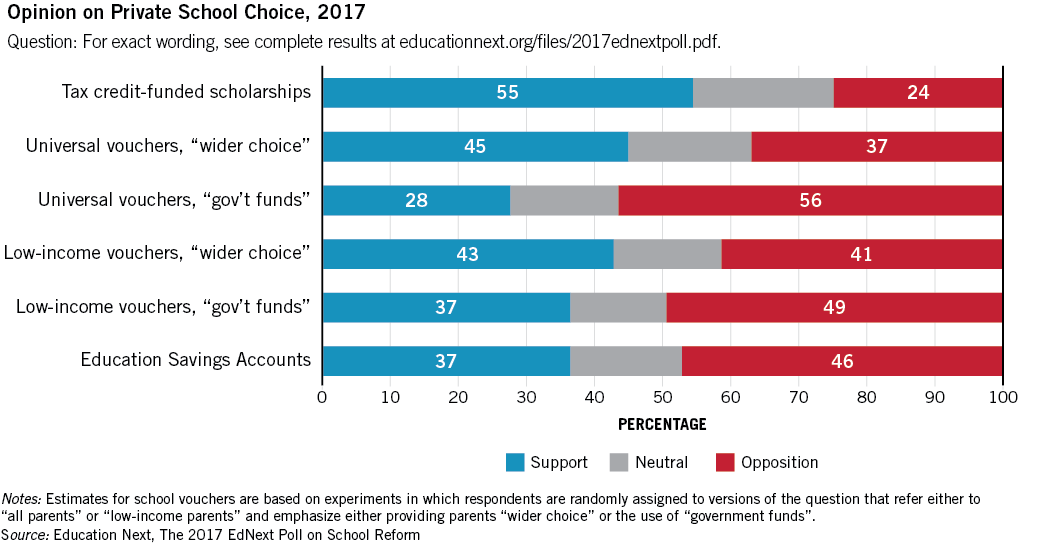What does the public think about school choice?
According to five different surveys conducted in 2017, most of the American public supports school choice, though many still don’t know about the issue. Opposition to school choice is weak and continues to decrease, especially as more people learn about how school choice works.
Gallup, the Associated Press-National Opinion Research Center (AP-NORC), Education Next (EdNext), Phi Delta Kappa (PDK) and EdChoice all measured the opinions of a representative sample of Americans on K–12 education, our public schools and different schooling options, such as charter schools and private school choice programs.
Most of the polling organizations found support and/or recent gains in support for school choice.
It is important to note that question wording and the definitions used to describe school choice differ from poll to poll. We encourage everyone to examine these surveys’ topline and related questionnaire documents to best inform their opinions on the quality of each survey.
AP-NORC
Four in 10 respondents of this April University of Chicago-led survey said American parents have too little choice when it comes to where their children attend school.

While such responses could conceivably yield support for school choice policies, AP-NORC found low levels of familiarity for such programs. Two-thirds of respondents, including three-fourths of parents, expressed hearing “little or nothing” about vouchers. A similar proportion—about six in 10—were unfamiliar with charter schools. This lack of awareness is even higher than EdChoice found in our latest Indiana survey of parents, hinting that state agencies and education reformers have a lot of work yet to do to educate the public about educational choice options.
Only 26 percent of respondents described the nation’s public schools to be “excellent” or “good.” If you only look at how public school parents responded to that question, only 52 percent said the nation’s public schools were “excellent” or “good.”
Gallup
This survey found a 27 percentage point gap between respondents who rated education at private schools vs. public schools as excellent or good. Though 71 percent of respondents rated private schools this way, only 10 percent of American students attend such schools. This disconnect points to a mismatch between Americans’ preferences and the type of education children actually receive.
While private schools’ ratings slipped slightly since Gallup’s last school rankings survey, released in 2012, they still rank as the preferred option of the American public. Gallup broke private schools down by “independent” and “parochial,” with the two subgroups ranking first and second, respectively, on perceived quality. Public charter schools fell 5 percentage points to 55 percent since 2012 but still ranked third in the survey, followed by homeschooling and public district schools.

PDK
This annual poll found public support for vouchers has grown 12 percentage points during the past four years. Opposition to vouchers fell at a greater rate during this time, decreasing 18 percentage points during the last four years.
PDK asked interesting questions that give insight to the “stickiness” of private school tuition and voucher amounts. About half of public school parents would stick with their children’s public school if given funds to send them to a private institution. The question was worded in a way that presumed all of the private school tuition would be covered in such a scenario. The number of respondents that said they would keep their children in a public school ballooned to 72 percent when the theoretical voucher amount was decreased to half of tuition costs. These data suggest that well-funded school choice programs are more attractive to the public.
This poll also found that just one-third of parents said they’d pick a traditional public school if location and money weren’t issues.
Interviewers for this poll have asked at least 10 different voucher-related questions since 1970, with three versions used most frequently. The figure below displays support trends of these versions.

As the chart shows, the voucher question has been volatile in PDK polls, especially in recent years. These variances and possibly loaded language point to this year’s low level of voucher support (39%) being an outlier in this poll’s long history.
Education Next
School choice was just one of 10 education-related topics that this poll detailed.
EdNext generally found high levels of support for different types of private school choice programs, though significant portions of the American public still don’t know about these programs or haven’t taken a stance on them either way.

EdChoice’s 2019 Schooling in America Survey
Among the general population we also saw steadfast support for private school choice programs. Education savings accounts (ESAs), in particular, saw a large increase compared to last year. Americans were more than twice as likely to support ESAs than to oppose them when interviewers provided them a definition of how these flexible education spending accounts work. The majority of even public school teachers support ESAs.
Flip through the key findings from this survey below.
To delve deeper into our national survey, which also includes an oversampling of rural families, visit our 2019 Schooling in America report.
EdChoice has also conducted national K–12 and school choice surveys of state legislators, military families, Millennials, Latinos and mothers. Click each of the links below to read more from those reports.
Surveying the Military
Millennial Perspectives on K-12 Education and School Choice
Surveying State Legislators
Latino Perspectives on K-12 Education and School Choice
Moms and Schools Surveys
Note: This page was last updated on May 16, 2018.